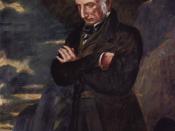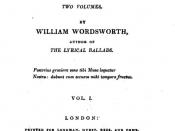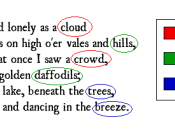Robert Frost's "Stopping by Woods on a Snowy Evening", William Wordsworth's "I Wandered Lonely as a Cloud", and Octavio Paz's "The Street" share similar themes in that they all explore solitude and insightfulness. There is an interesting contrast within this group of poems, especially between the Frost and Wordsworth poems and Paz's illustration. The first two poems are gentle and simple in their tone, whereas the last is quite solemn and worrisome. Frost and Wordsworth put positive connotations behind the themes of their poems, while Paz's theme is mostly negative. All three poems examine what a person might reflect on when they are alone and whether or not that reflection might be an affirmative or depressing experience.
Robert Frost's "Stopping by Woods on a Snowy Evening" is a simple, understated narrative lyric. The speaker pauses briefly on a snowy evening to experience the breathtaking beauty of the woods.
In the poem the speaker begins by letting the reader know where he is. He has stopped by the woods to enjoy the beauty of nature as the woods fill with snow. He uses simple and easily understood words. "Between the woods and frozen lake" (Frost 1015) kindle images of the rider on a lonely road with the woods in the distance on one side and the frozen lake on the other. In the speaker's closing remark "But I have promises to keep, / And miles to go before I sleep" (Frost 1016), it is evident that even though the woods are compelling him to stay, he is compelled more so by his obligations and the demands of his life and those that society has placed on him. The entire poem paints a very vivid image of the peaceful woods.
William Wordsworth's "I Wandered Lonely...


